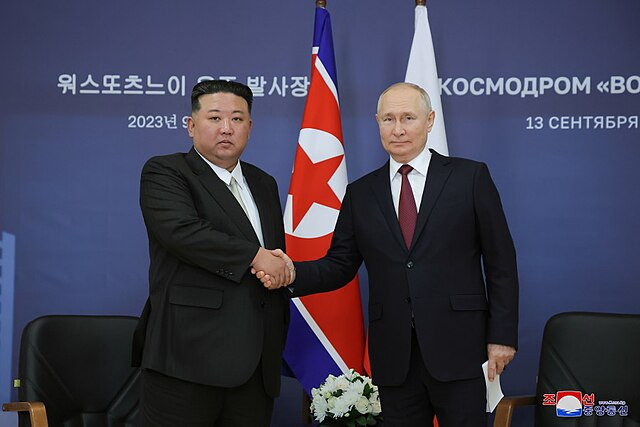North Korean troops deployed to Russia's Kursk region have reportedly encountered their first combat since being stationed near the Ukrainian border, marking a significant escalation in the conflict between Ukraine and Russia. Ukrainian officials, including Andrii Kovalenko, head of the Center for Countering Disinformation at Ukraine's National Security and Defense Council, announced on Monday via Telegram that "the first military personnel of the DPRK have already come under fire in the Kursk region of the Russian Federation." While his claims remain unverified, Kovalenko's statement represents the first official report of North Korean soldiers engaging in combat on Russian soil.
The Kursk region, which borders Ukraine, has become a focal point of conflict since Kyiv launched an offensive in August, pushing the fight deeper into Russian territory. According to U.S. Secretary of State Antony Blinken, around 8,000 North Korean troops are stationed in Kursk, although sources in Ukraine believe that up to 12,000 North Koreans, including special forces, could eventually be deployed in support of Russian operations.
The involvement of North Korean troops has drawn sharp criticism from Ukraine's allies. Last week, Ukrainian President Volodymyr Zelensky expressed frustration over what he called a "zero" response from Western allies to Russia's collaboration with North Korea. Zelensky reiterated his calls for authorization to use long-range weaponry to strike North Korean encampments and training grounds in Russian territory, which he says is vital to counter Russia's strengthened defenses.
South Korea, a key ally in the region, has also voiced concerns. South Korean Defense Minister Kim Yong Hyun met with EU foreign policy chief Josep Borrell in Seoul, where they issued a joint statement condemning North Korea's reported troop deployment. The two agreed to collaborate with international partners to counter the growing security ties between Russia and North Korea.
"The war is being carried out in the form of drone combat, but North Korean troops have not been supplied with drones and have not been trained accordingly, so we anticipate considerable damage," a spokesperson for South Korea's Defense Intelligence Agency (DIA) said on Wednesday. The DIA also expressed doubts about North Korean soldiers' ability to adapt to the unfamiliar terrain and unique combat conditions in Ukraine.
British intelligence echoed this assessment, suggesting that North Korean and Russian forces could face operational challenges due to their lack of joint training. The U.K. Defense Ministry noted that "Russian and DPRK forces would almost certainly experience interoperability difficulties having not previously carried out joint military exercises." Experts argue that language, cultural differences, and contrasting military doctrines could hinder coordination and reduce the effectiveness of North Korean forces on the front lines.
In response to escalating reports, Ukrainian officials have been intensifying calls for international action. Kovalenko and other Ukrainian leaders are urging their Western allies to take a firmer stance against the North Korean-Russian alliance, fearing that continued deployments from Pyongyang will only prolong the conflict and complicate Ukraine's efforts to push back Russian forces.
The Biden administration has maintained its vigilance over the developments. The U.S. has recently confirmed its awareness of North Korean forces near the border but has not yet revealed any new measures in response to the situation. With North Korean involvement growing, U.S. officials are reportedly reassessing their strategy in Ukraine to address the broader geopolitical implications of Pyongyang's involvement.
The Kremlin, meanwhile, has remained largely silent on the presence of North Korean forces, choosing not to confirm or deny these reports. Russian officials have instead dismissed allegations of troop deployments as "foreign disinformation," a stance echoed by North Korea, which has avoided commenting on its citizens' reported role in the conflict.
Adding to the international dimension, Ukrainian intelligence sources claim North Korean soldiers have been stationed near the front lines and could be prepared for deployment at any time. British and U.S. intelligence agencies are reportedly monitoring the region closely, wary of the potential ramifications of direct involvement by a nation as isolated as North Korea in the ongoing Russia-Ukraine conflict.
Amid mounting tensions, South Korea is pursuing measures to ensure that North Korea's involvement does not set a precedent for future military cooperation between Pyongyang and Moscow. South Korean President Yoon Suk Yeol has been briefed on the situation and is reportedly considering several diplomatic avenues, including increased collaboration with Japan and the U.S., to curb North Korea's influence in the region.




